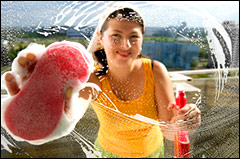Dear Umbra,
I recently moved in with my investment-banker boyfriend. So far, my efforts to teach him to have more fun with less stuff have been largely successful; however, I’ve hit a roadblock when it comes to his cleaning lady. My first question, Umbra, is this: what are the social and ecological implications of hiring a maid (one who commutes using public transportation and is paid more than double minimum wage)? How guilty should I feel for coming home to a clean house every Friday night? And my second question, assuming I can rationalize keeping a maid, is what cleaning products should I buy/make for our maid to use?
Last week she gave me a list of nine cleaning products that I “needed” to buy. Is there one low-impact solution that will keep steel counters, wood floors, and bathroom tiles all sparkling? How bad is Windex? Do phosphate-free dishwasher soaps really work? Will whites stay white without hot water and bleach? What are the really nasty chemicals and brands to look out for when buying conventional products?
Scouringly yours,
Dana
Montreal, Quebec, Canada
Dearest Dana,

Transparency is key.
Photo: iStockphoto
Score! Do not feel guilty. Feel relaxed. Your boyfriend has an employee, whose job it is to clean the house. Certainly look into her job satisfaction as best you can, and if you believe there may be benefits that would make the situation better for her, try to achieve them. In my locality these benefits might include paying her Social Security taxes, or giving paid holidays and bonuses. If this woman is well paid, well treated, and knows she has job security, I don’t see a social problem. I’m sure there are all sorts of historic social reasons why we feel bad about having housecleaners, including that housecleaning has an image as a job no one wants to do, maybe just the only job they qualified for or were socially permitted to get. If you discover that housecleaning is the only job your maid could get, mayhap you can offer to assist her with whatever barriers there are to other work she might want. Don’t assume, however, that this is a bad job for her.
In the free time you’ve gained by having a clean house, you can shop for or make cleaning products. Herein I will compile from previous columns what-all I’ve learnt about cleaning products in the last while. There are four low-impact solutions to keep it all sparkling. Store-bought cleansers can almost all be replaced by baking soda, vinegar, castile soap, and hot water. Baking soda has a scouring and antifungal property, and its manufacture is relatively low-impact. Vinegar is an acid that counteracts bacteria and mold. Soap cleans up dirt, and you know all about hot water. These four tough cookies can be combined into various recipes. Once you’ve found (online or at the library) and made the recipes, put your new cleansers into spray bottles or jars and label them “for windows and counters,” “for bathroom tile,” etc. In addition to providing guidance, the relabeling will lend an air of authenticity, in case your housecleaner looks askance at cake ingredients as cleansers.
Buying your cleansers is also simple. After my last column on NPE (I will not spell it out ever again), brilliant readers wrote in as usual with their own cleaning recipes and comments. The whole reader comment system is divine, and in this case there are good cleaning tips. One person pointed out the EPA’s Design for the Environment program, which certifies some consumer cleaning products. You may wish to peruse their partner list and notate brands upon your shopping list. Most cleaning products now have “natural” counterparts offered by the brands that dominate the “natural” products aisle, but be sure to look for specificity beyond such vague claims. As you shop for prepared cleansers, including detergents, also keep in mind the following cautions: avoid chlorine bleach; buy phosphate-free and NPE-free when possible; and read the “Danger, Caution, and Warning” label. I may have previously connected you all to my favorite cleaning-related document, Safer Cleaning Products [PDF]. I encourage all ye home cleaners to look it over again. It does more justice to all your concerns than I ever could do, even compiling all the answers I’ve given over the years.
Finally, my phosphate-free dishwashing soap seems to work. And according to the National Institutes of Health’s Household Products Database, the Windex label reads in part, “Hazards to humans and domestic animals”; I’ll let you evaluate how bad that sounds to you. I do not know firsthand how to keep white laundry white, though I hear tell lemon juice and baking soda can do the trick. I look forward to reader comments on this issue.
Dirtily,
Umbra


